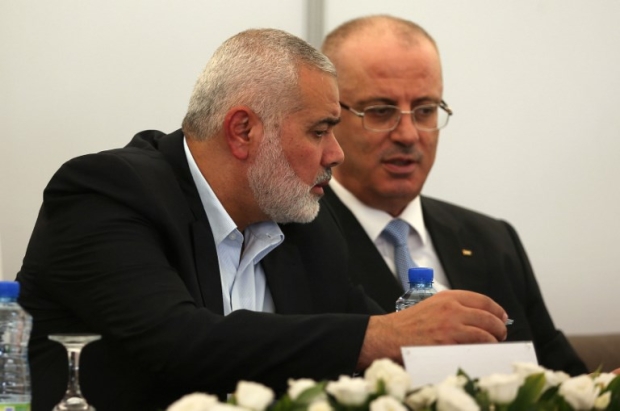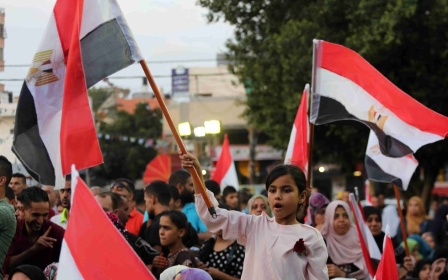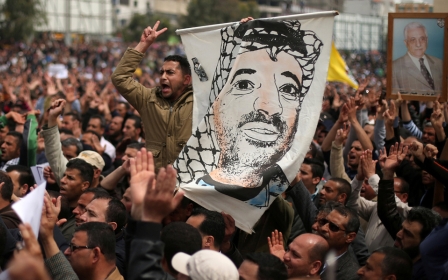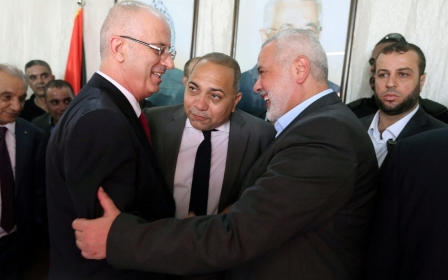Fatah fears it will be 'trapped' by Hamas in Lebanon-style deal in Gaza
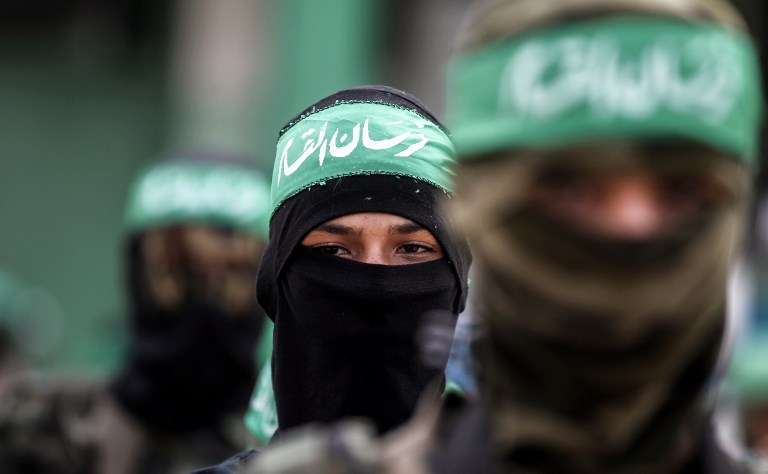
GAZA CITY/RAMALLAH, Palestine - As the Palestinian government took the first symbolic and ceremonial reconciliation steps in Gaza, officials in the Palestinian Authority in Ramallah said they are deeply concerned about Hamas’ apparent intention to “trap” them in a Hezbollah-style power-sharing deal in the strip.
PA President Mahmoud Abbas himself referred to the Lebanese political party, whose militant wing oversees security over certain areas of the country.
In an interview with the Egyptian TV channel CPC on Monday, he said: “It should be very clear that I will not accept a copy of the Hezbollah style in Gaza.”
Officials close to Abbas told MEE that the president will not accept a partial deal that leaves Hamas in control on the ground while his government takes full responsibility for service provision.
“The president will not accept just being an ATM machine in Gaza: either his government takes full control or not at all,” Majid Fityani, head of the Fatah Revolutionary Council, said.
The president will not accept just being an ATM machine in Gaza: either his government takes full control or not at all
- Majid Fityani, head of the Fatah Revolutionary Council
“Every single gun and every single bullet in Gaza must be under the Palestinian law,” he added.
For its part, Hamas has stressed its willingness to make “painful concessions” to make the reconciliation happen.
Senior Hamas officials told MEE the movement wants to get rid of the government burdens in Gaza and focus on rebuilding the movement, and entering the Palestinian political system.
Hamas rule in Gaza Strip has been in a deep financial crisis since 2013, when Egypt blocked the commercial tunnels between Egypt and Gaza, depriving the Islamic movement of major financial revenues.
Following the closure of the tunnels, the local Hamas government has paid only 50 percent salary to its 40,000 government employees.
And the financial crisis in Gaza has only deepened since the unprecedented measures Abbas took earlier this year.
Abbas cut 30 percent of the salaries of 60,000 allegedly idle PA employees in Gaza and scaled back the payments for the electricity sector.
He also sent several thousand civil servants working in the Hamas government and receiving salaries from his government into early retirement, and reduced expenditure on several key ministries, such as health and education.
Abbas’ aides say the president took such tough measures to force Hamas to turn Gaza over to the PA.
Concessions or traps?
Hamas officials tell MEE that they are willing to make concessions in three areas which hindered previous attempts at reconciliation between the two sides: crossings; the security apparatus and government employees.
But Fatah is concerned that these concessions are only designed to trap Fatah and burden them with all the trappings of government, party officials tell MEE.
Senior Fatah and Hamas delegations are to meet in Cairo next Tuesday to discuss these three policy areas.
Abbas also said on Monday that the PA “needs to take over everything in Gaza”.
And he stressed that there could be only "one state, one regime, one law and one weapon" in the Gaza Strip.
Officials in Fatah reiterated that this is indeed Abbas’ priority.
“We cannot accept to rule under the control of Al-Qassam Brigades,” one official told MEE, referring to Hamas' military wing.
But it will not be easy for Abbas to walk away from the talks, fearing that Egypt would replace this path of reconciliation with an alternative path, brokered between his rival, Mohammed Dahlan, and Hamas.
Egypt helped both Dahlan and Hamas to reach a deal shortly before it invited Abbas for a similar round of talks that led to this current agreement with Hamas.
Hamas officials say they are willing to have “creative solutions” for the Al-Qassam Brigades and all various military wings in Gaza.
Hamas’ Gaza leader Yahya Sinwar has proposed a “national army” in Gaza that encompasses Al-Qassam Brigades and the other military groups, consisting of thousands of fighters.
“There is coordination between Al-Qassam Brigades and all military brigades in Gaza to have one unit and build a Palestinian National Army,” he said in a speech before youth activists a few days ago.
'Creative ideas' being pursued
One of the “creative ideas” being discussed within Hamas is to have Al-Qassam Brigades operating underground, with PA above ground.
Officials say Hamas is also going to propose, in the Cairo talks next week, the introduction of a different system for security services in Gaza, as a “liberated part of the country” and not adopting the PA’s so-called “security coordination” with Israel, and also not sharing security information with any other foreign security agencies.
Conflict issues will also be determined collectively, according to Hamas official Moussa Abu Marzouk, who said in Moscow last week that: “We are ready to share the decision of war and peace with the PA.”
“War and peace are national matters and Hamas is willing to share positively the responsibility of the decision on these issues with the PA,” he said.
'War and peace are national matters and Hamas is willing to share positively the responsibility of the decision on these issues with the PA'
- Moussa Abu Marzouk, Hamas official
But, he said, “The issue of Al-Qassam’s arms was not on the discussions” in the previous Cairo talks.
Some in Hamas believe Sinwar has gone too far in his concessions to Abbas, and he has been criticised on social media.
Sinwar said Hamas is unified in its support for reconciliation and that those most behind the deal are Ismail Haniyeh, chair of the political office, and commander of the Al-Qassam Brigades, Mohammd Daif and the commander of the West Bank, Saleh Arouri.
And as far as it is concerned, officials say, Fatah and the PA have no desire to wrest control of Gaza from Hamas.
Egypt's motivations
The first Fatah leadership meeting after the most recent Cairo talks was not decisive and three main positions emerged.
Some within the leadership believed that Hamas should not be trusted, and that the party should keep out of Gaza.
But a second grouping believed that it would be unwise to reject such an offer, and that initial steps should be taken to gauge just how serious Hamas is.
The third position was that the offer had to be accepted, regardless of Hamas’ real intentions, as the people of Gaza desperately need help, and Fatah is the only party capable of delivering such badly needed services.
Abbas concluded by deciding to send his government to Gaza to see how serious Hamas were.
But in the meantime, Egypt is still keen to oversee the reconciliation process, and to see it completed.
When Palestinian Prime Minister Rami Hamdallah arrived in Gaza on Monday, Egypt sent senior intelligence officers and a media team to monitor the process.
PA officials say Egypt abandoned the Hamas-Dahlan talks after they feared it would lead to a permanent separation of Gaza and the West Bank, something the current government did not want to bear historical responsibility for, and this is why they moved towards brokering a deal between Hamas and Fatah.
They say also Egypt is to play a regional role in the Donald Trump plan for peace in the region and nothing can be done without Abbas and the PA.
Many observers also believe that Egypt's involvement in the Palestinian reconciliation is motivated by a desire to become a prominent regional player, akin to its rivals Qatar and Turkey.
Hamdallah, along with a number of his ministers, left the Gaza Strip on Thursday morning, according to AFP.
The two sides will now meet again on Tuesday in Cairo.
New MEE newsletter: Jerusalem Dispatch
Sign up to get the latest insights and analysis on Israel-Palestine, alongside Turkey Unpacked and other MEE newsletters
Middle East Eye delivers independent and unrivalled coverage and analysis of the Middle East, North Africa and beyond. To learn more about republishing this content and the associated fees, please fill out this form. More about MEE can be found here.


